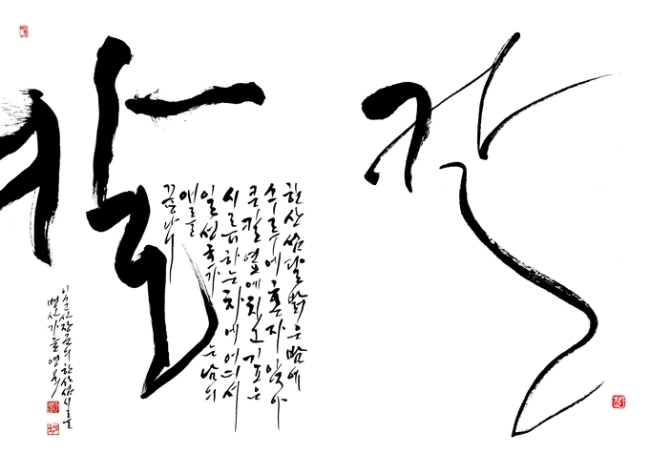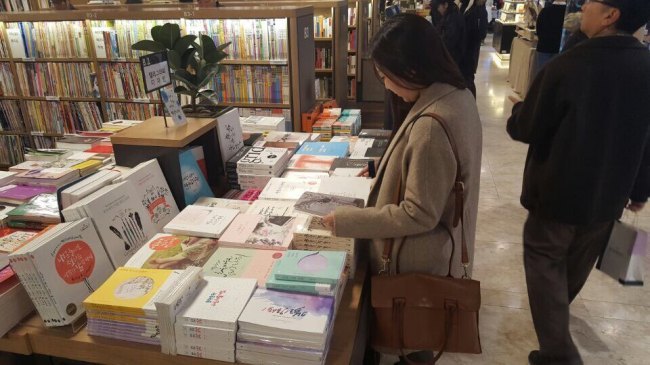The rapid adoption of digital devices in recent years is reshaping the concept of writing.
A growing number of people view writing as a synonym of typing on PC or taking notes on their smartphones. For tech-savvy people, a traditional pen is nothing but an outdated and inconvenient tool.
But this tech-oriented perspective is yet to convert the growing group of calligraphy enthusiasts with a penchant for beautiful writing.
Calligraphy is making a comeback in Korea. Signs in favor of what people have long deemed a lost art are popping up everywhere.
 |
Hangeul calligraphy has diverse styles, depending on the mood a calligrapher wants to present. (Kang Byung-in Calligraphy Institute Sooltong) |
According to Auction, an online shopping website, sales of fountain pens jumped 20 percent this year in comparison with last year, thanks in part to people rushing to learn the art of calligraphy or simply to improve their handwriting through various classes.
Demands for books featuring inspirational quotes written in notable calligraphic styles are steadily growing each year, marking 52 percent expansion rate this year in comparison with the previous year, according to Kyobo, South Korea’s largest bookstore.
 |
A reader flicks through books in the calligraphy section of Kyobo Book Centre in Gwanghwamun, Seoul. (Lim Jeong-yeo / The Korea Herald) |
An increasing number of lectures and classes across the country are also offering opportunities to learn calligraphy in a digital era when handwritten letters are a rarity. Among them is Micro Impact School, a private institute in Seoul, whose classes are popular among people of all ages who sign up for calligraphy courses.
“Calligraphy is such a beautiful art and it is not just a fad,” Moon Jin-su, 29, who recently calligraphy classes at the institute for several hours. There are so many styles of calligraphy, not to mention many different kinds of pens to use, and the skills he learned during the handwriting class actually came handy in daily life, he said.
“In the business meeting I attended, I gifted one of the clients with my own handwritten thank-you card. He simply loved it and he said he couldn’t thank me enough.”
Moon, who works in a retail business in central Seoul, said his interest in calligraphy was sparked by photos of calligraphy on the internet.
“My first thought was ‘Why can’t I write like that?’ Then I began to practice calligraphy and I realized this art demands a certain amount of time, concentration and patience for its refinement and styles to truly be mine on paper,” he said.
Return to old-school art
For some, beautifully handwritten letters on paper mean more than the simple pleasure they get from their work. Sophisticated skills and endeavors required during training process, push them to compete with one another to create the best artwork.
In fact, thousands of participants gathered online to beat the 100:1 odds to win the handwriting competition that was recently held in Seoul by Kyobo. The strong showing of applicants demonstrates a pent-up desire to showcase their beautiful handwriting skills.
The organizer of the handwriting contest, renowned poet Shin Dal-ja, told the Korea Herald that the growing population eager to learn and share their handwriting skills “derives from a reaction to a gadget-filled society.”
“It is the second handwriting contest since 2015 and we are still amazed by the number of participants, which stood at 3,480 this year and will be more the year after,” Shin said. “People might ask, ‘Why handwriting now, in the world of artificial intelligence, where AlphaGo challenges conscious beings?’ I say, it is a lack of appreciation of being slow and patient that attracts people to the analog age.”
To Shin, computers and digital gadgets, however smart and convenient they might become, “hardly satisfy some basic human emotions hidden deep in their minds.”
But why and how does handwriting offer a reprieve to digital-weary Koreans?
“When we write something on a piece of paper, we are delivering warmhearted compassion and love embedded in letters to whomever you are reaching out to. With typing, there is no sincerity and effort but only efficiency,” Shin said.
In the digital era, people are addicted to the overwhelming advantages of technology. They are finally noticing the long-forgotten value of writing on real paper with their own hands, Shin said.
By Bak Se-hwan (
sh@heraldcorp.com)









